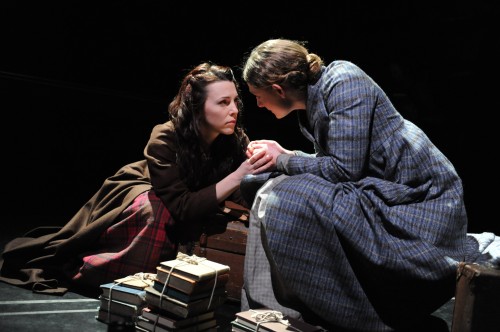
Being Mary Shelley was no joke.
Her father, the philosopher William Godwin, was such an advanced thinker that he seemed to have left all natural, earthly bonds far behind. Godwin wrote a memoir of Mary’s mother – only months after she’d died owing to complications of child birth – which revealed illegitimate children, love affairs, and serial suicide attempts. Society was scandalised and he was accused of “stripping his dead wife naked.” Godwin remarried, to a woman of less Romantic proclivities, went into the book trade, and brought Mary and her two half-sisters up in an environment where ruminating on the moral and intellectual improvement of mankind in general was considered more pressingly urgent than paying the grocer who was banging on the door waiting for last months bill to be squared. Mary was encouraged to read a lot, pretty much without parental supervision, and allowed to indulge in fantasies about the freedoms her deceased birth mother supposedly enjoyed. All told, a recipe for domestic disaster.
Helen Edmundson’s version of the story currently on at the West Yorkshire Playhouse follows what happens when a catalyst, in the form of unkempt, unconventional, dashing minor aristocrat Percy Bysshe Shelley is introduced into the familial drama. Shelley has just been kicked out of college for atheism (or so he tells everybody, the reality was something more mundane) and he writes interminable poems on lofty subjects. He idolises Godwin, so much so he’s promised to bankroll the foolish philosopher. He wears flouncy shirts. He talks and talks and talks. He’s every sixteen year old romantically inclined girls dreamboat. Except for the being married with a young child bit. But that’s just a technicality the brilliantly bookish can brush off with barely a thought.
Mary falls out with her step mother, inevitably, over something and nothing. She out-manoeuvres her elder sister, who obviously had the hots for the fast talking fop, and colludes with the younger sister who she gets to connive and enable the budding romance. At the end of the first half the father has put his foot down and demanded Mary give her word she will not see Shelley again.
The second half begins and all has changed on stage. The book cases, which had provided a kind of dignified, solid domestic stability earlier have been shifted, and now have a strangely menacing appearance. We are never sure where we are in the second half as the scene shifts from a boat across the Channel, a small village in France, a chateau in Geneva, a town house in Bath, street in London . . . the location changes are dizzying.
Mary has eloped with Shelley. They have taken Mary’s younger sister Jane – soon to rename herself Clare, for reasons of Romantic resonance – and Godwin has disowned them all. He still is keen to get Shelley’s cash, however. Mary gets pregnant. The child dies. Jane/Clare makes a play for Shelley then gets pregnant by Lord Byron in a bizarre attempt at one-upmanship. Shelley manages to give Godwin money but not as much as he’d promised – he has a couple of families to support he finally remembers – and the bookshop goes under anyway. Mary’s elder sister poisons herself. Shelley’s wife Harriet is found dead in the Serpentine. Mary gets pregnant again. And while all this is happening Mary manages to write Frankenstein.
Considering the death toll the play is surprisingly funny. The relationship between Godwin and his wife is particularly well observed and beautifully played. During a crucial argument when Mrs Godwin recommends making amends and accepting Shelley’s new offer to pay off the families debts she strops off after listening to one more lecture about “Political Justice,” which, she says, “no one really believed in the first place!” Godwin turns to the audience and delivers the perfect put down; “You have been tantalising us with the prospect of your demise for several months now, yet here you are, as large as life.” I think that line got the biggest laugh of the evening.
This was also a bit of a weakness. Whenever we heard the phrase, “Political Economy,” we knew we were being set up for a gag. There is something risible in Godwin’s idealism and his principles, but they were portrayed as so entirely unbelievable that we could never really relate to them as genuine motivators of behaviour. How Godwin managed to reconcile “Political Economy” – a belief in the “criminality of property rights, of inheritance, and of the landowning class” – with getting a baronet to bail out his book business is never really explored. And how the same ideals and principles spur Shelley on to swan about Europe “communing” with everything with a pulse (and her sister) is simply left as a bad joke. And how all that contributed to the writing of Frankenstein is an absolute mystery.
Still, as a domestic drama about family commitments, sibling rivalry, marital compromise, and the best way to foster creativity in your daughters it has a lot to say. The performances are brilliant, and it’s never less than entertaining and thought provoking.
Mary Shelley is on at the West Yorkshire Playhouse until April 7.